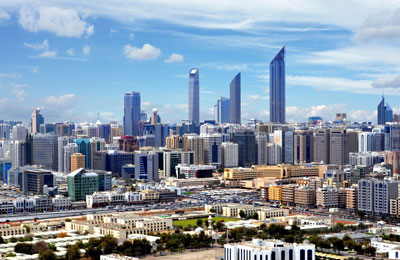
Abu Dhabi rents down 24pc in Q2
Abu Dhabi, August 15, 2012
The residential rents in Abu Dhabi registered a 24 per cent drop in the second quarter over the same period last year amid continuous supply of new housing units and heightened competition, according to a new report.
Abu Dhabi’s rapidly changing residential landscape has resulted in a fragmented marketplace with specific areas and developments outperforming the wider market, said the report by leading property expert CBRE.
This trend is envisaged to continue as inventory levels expand as more quality product is delivered, the CBRE said in its 'MarketView Q2 2012 for Abu Dhabi.'
The property expert pointed out that the UAE capital continued to witness declining rental rates in the second quarter as well registering a 4 per cent drop over the previous quarter.
With an expanding array of new waterfront properties and prime quality towers in central locations now available, there is growing interest from mid to high-income occupiers in search of an upscale lifestyle experience that was previously out of reach in the capital, said the expert.
The flow of new residential units continued, with a large number of high-end projects being completed this year, helping to diversify the existing product mix, it added.
However, this was in contrast to some new luxury schemes such as the St Regis Residences and Etihad Towers where rental values remained broadly static over the period on the back of solid occupancy rates, strong corporate interest and the continued flight to quality, it noted.
The CBRE pointed out that the recent amendment to Abu Dhabi’s visa law had drawn mixed reactions from the market and shared concern amongst lower-income expatriates who may be directly impacted by the potential amendments.
In a move intended to further regulate the real estate sector, the government had recently announced new requirements relating to the provision of rental contracts and attested utility bills for family/spouse visa processing only.
The rule is currently deferred for expatriates under company visa sponsorship, giving temporary relief for the sizeable number of expatriate workers who could be directly impacted by these amendments, said the report.
A total of 2,161 new commercial licenses were issued in Abu Dhabi during the first quarter. This took the total licenses registered in the emirate to 105,953, said the CBRE report citing the emirate's department of economic development.
Continued growth in commercial activities is translating into some additional requirements for commercial accommodation and housing for employees and their families, it stated.
However, at this stage new supply is outstripping new demand, resulting in growing vacancy rates across the market, it added.
CBRE pointed out that affordability remained a key concern for a large portion of the capital’s populace, but the proposed visa rules may have the impact of increasing housing costs for the relatively high proportion of the population that is currently residing in shared accommodation.
Should the government choose to implement and enforce the no-sharing policy, the demand for smaller residential unit types could well escalate, inevitably to the detriment of larger properties, it added.
On the 2012 outlook, CBRE said deflationary pressures were likely to persist during the second half as new supply continued to outpace growth in demand and heightened competition aggravated already falling rents.
As a fragmented marketplace increasingly becomes apparent, location and quality- specific disparities are likely to widen as tenants look to exploit opportunities as the market edges closer to the bottom.
This will mean rising office vacancy levels in secondary locations and inferior quality properties as occupiers look to upgrade amidst availability of greater options in the market.
On the office sector, CBRE said overall the activity remained sluggish with the emirate’s moderate economic recovery so far failing to drive forward any real upswing in the real estate sector.
'With a large volume of new supply being delivered, further lease rate declines before the year end are inevitable. Although some notable commercial occupiers are actively seeking space in the market, many tenants appear to be waiting for the bottom of the current rental cycle before seriously pursuing new space requirements,' it stated.
Prime office rents during the quarter remained flat at around Dh1,600 – Dh1,900 sq m ($436 to $517), although rental variations were evident depending on the specific tenant and overall incentive package offered.
With ever growing office stock, more competitive and creative incentive provisions are being utilised as part of standard leasing procedure, said the report.
With many companies exercising a cautious business approach, coupled with rising vacancy rates, landlords are facing a mounting challenge to source tenants and maintain occupancy rates without sacrificing headline rents, particularly within older buildings, the CBRE said in its report.
Secondary and inferior office products continue to suffer from widespread rental deflation which has averaged 8 per cent since the start of 2012, it added.
As market uncertainties slowly dissipate, a more active leasing market should start to emerge with increased demand expected from the private sector, although this looks unlikely to take place during the current year, the property expert noted.
In addition to effects of traditional summer slowdown, anticipation of further rental cuts later in the year is influencing some occupier decisions to delay their real estate leasing requirements, the report added.-TradeArabia News Service







